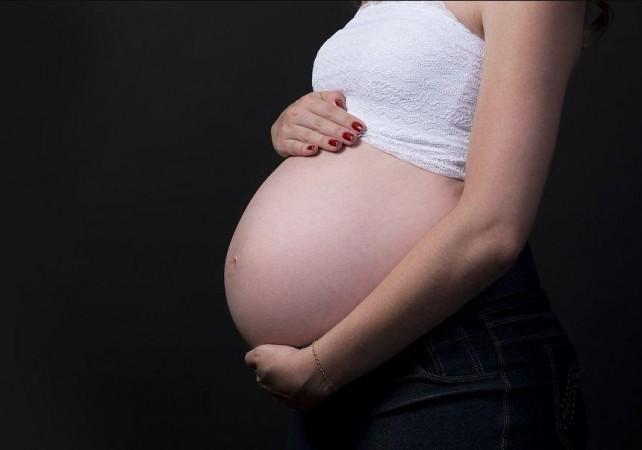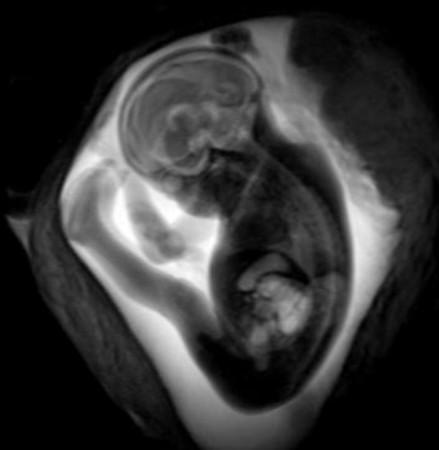Since the onset of the COVID-19 pandemic, several groups of individuals have been categorized as high risk. This includes pregnant women as well. A major concern surrounding expectant mothers is the impact of their infection status on their unborn child. Assuaging this worry, scientists have reported that a mother being infected with the SARS-CoV-2 virus during pregnancy does not harm her baby's brain.
According to a new study, developing fetuses of mothers suffering from mild to moderate COVID-19 did not exhibit any signs of brain damage or infection. It was also found that the brain development in the key areas examined was age-appropriate in all the fetuses. The findings are set to be presented at the 107th Scientific Assembly and Annual Meeting of the Radiological Society of North America.
"In our study, there was no evidence that a maternal SARS-CoV-2 infection has any effect on the brain development of the unborn child. This fact should help to reassure affected parents," said Dr. Sophia Stöcklein, senior author of the study, in a statement.
Impact of Maternal Infection

The fear of vertical transmission—passing of a pathogen from mother to fetus—has caused widespread panic since the emergence of the SARS-CoV-2 virus. Studies have attempted to ascertain all potential impacts of maternal COVID-19 infection on unborn children such as transfer of immunity, anatomical development, and the absence of viral transmission, among others. However, there are no conclusive answers to these questions.
"So far, although there are a few reports of vertical transmission to the fetus, the exact risk and impact remain largely unclear. The aim of our study was to fill this gap in knowledge regarding the impact of a maternal SARS-CoV-2 infection on fetal brain development," stated Dr. Stöcklein.
For the study, the team evaluated fetal MRIs obtained from 33 pregnant women who had contracted COVID-19. Their mean gestational period was 28.4 weeks—a minimum of 18 weeks and a maximum of 39 weeks. The mean onset of symptoms was at 18.3 weeks (ranging from four to 34 weeks).

Anosmia/hyposmia (loss or reduced sense of smell) and ageusia (loss of taste) were the most predominant symptoms among the participants; being reported in 87.9 percent (29/33) and 78.8 percent of (26/33) of them respectively. Other symptoms observed among the infected mothers included dry cough (57.6 percent; 19/33), dyspnea or shortness of breath (30.3 percent; 10/33), and fever (27.3 percent; 9/33).
No Effect on Brain Development
The researchers learnt that crucial characteristics of brain development in fetuses—cortical folding, opercularization of the Sylvian fissure, and transverse cerebellar diameter—were age-appropriate. In addition to this, they also found that the development of the areas such as the pons, medulla oblongata, midbrain, and cerebellar vermis, was within age-appropriate limits.
None of the fetal MRI scans showed any signs of calcifications, edema, or ventricular enlargement. Though 7 fetuses exhibited mild asymmetry of the lateral ventricles, the maximum difference was 4 mm. Nevertheless, the authors admitted that only mothers with mild to moderate symptoms of COVID-19 were included in the study. Also, none of them had been hospitalized on account of the disease.

"Since the impact of severe infection on brain development in the fetus has not been conclusively determined, active protection against SARS-CoV-2 infection during pregnancy remains important," stressed Dr. Stöcklein. Over the next five years, the team will follow up with the patients, including the comprehensive assessment of neonatal health and neurological development.
Emphasizing that inoculating mothers against the novel coronavirus is still the best preventive measure, Dr. Stöcklein concluded, "So far, vaccination is the most promising protection against COVID-19. Any potential side effects are manageable, even in pregnant women. Therefore, despite the encouraging results of our study, pregnant women should strongly consider vaccination."










